Unit 1 School life
牛津高中英语必修一Unit 1 School life 重点知识归纳 当堂训练 课后巩固(含答案)
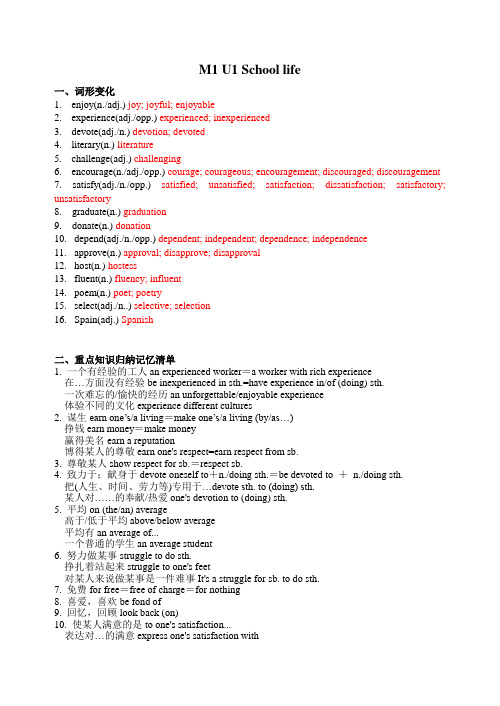
M1 U1 School life一、词形变化1.enjoy(n./adj.) joy; joyful; enjoyable2.experience(adj./opp.) experienced; inexperienced3.devote(adj./n.) devotion; devoted4.literary(n.) literature5.challenge(adj.) challenging6.encourage(n./adj./opp.) courage; courageous; encouragement; discouraged; discouragement7. satisfy(adj./n./opp.) satisfied; unsatisfied; satisfaction; dissatisfaction; satisfactory; unsatisfactory8. graduate(n.) graduation9. donate(n.) donation10. depend(adj./n./opp.) dependent; independent; dependence; independence11. approve(n.) approval; disapprove; disapproval12. host(n.) hostess13. fluent(n.) fluency; influent14. poem(n.) poet; poetry15. select(adj./n..) selective; selection16. Spain(adj.) Spanish二、重点知识归纳记忆清单1. 一个有经验的工人an experienced worker=a worker with rich experience在…方面没有经验be inexperienced in sth.=have experience in/of (doing) sth.一次难忘的/愉快的经历an unforgettable/enjoyable experience体验不同的文化experience different cultures2. 谋生earn one’s/a living=make one’s/a living (by/as…)挣钱earn money=make money赢得美名earn a reputation博得某人的尊敬earn one's respect=earn respect from sb.3. 尊敬某人show respect for sb.=respect sb.4. 致力于;献身于devote oneself to+n./doing sth.=be devoted to +n./doing sth.把(人生、时间、劳力等)专用于…devote sth. to (doing) sth.某人对……的奉献/热爱one's devotion to (doing) sth.5. 平均on (the/an) average高于/低于平均above/below average平均有an average of...一个普通的学生an average student6. 努力做某事struggle to do sth.挣扎着站起来struggle to one's feet对某人来说做某事是一件难事It's a struggle for sb. to do sth.7. 免费for free=free of charge=for nothing8. 喜爱,喜欢be fond of9. 回忆,回顾look back (on)10. 使某人满意的是to one's satisfaction...表达对…的满意express one's satisfaction with11. 和某人交换某物exchange sth. with sb.用A交换B exchange A for B以交换…in exchange for...12. 前者,后者the former,the latter 我以前的同事my former colleague13. 毕业于graduate from 毕业之后after graduation14. 把…捐给…donate...to...15. 谢谢你的好意thank you for your kindness16. 独立于某人be independent of sb. 依靠某人be dependent on sb.17. 利用make use of=take advantage of充分利用make full use of=make the best of=make the most of18. 明朝the Ming Dynasty19. 北京大学的王教授Professor Wang from Beijing University20. 告知某人某事inform sb. of/about sth.随时让某人了解某事keep sb. informed of sth.21. 开放时间opening hours22. 经营一家旅馆/自己的人生run a hotel/one's life23. 批准一项计划approve a plan=give approval to a plan同意某人做approve of sb. doing (不可用agree sb. to do)24. 现场直播be broadcast live 在电台里播放be broadcast on the radio25. 去远足go for an outing26. 一代代地传了下来be passed down generation after generation/from generation to generation为后代造福benefit future generations消除代沟narrow/bridge the generation gap27. 一个发达的国家a developed country 一个发展中的国家a developing country逐步养成…的习惯develop the habit of... 逐步对…感兴趣develop an interest in...冲洗照片develop photos患癌症develop cancer研制新的药物develop a new drug28. 文学作品literary works29. 参加集会attend an assembly30. 对…来说可得到的be available for…31. 错过做某事的机会miss the chance to do sth.32. 跳绳v. skip the rope n. the skipping rope33. 报名参加sign up for34. 发表演讲make/deliver a speech/an address35. 几件设备several pieces/items/articles of equipment当堂训练,探究问题一、根据首字母写出英语单词1.Simon worked an e xtra hour today so that he could finish the work earlier.2.8 hours is a fairly a verage working day for most people, but not for teachers.3.The best way to earn respect was to d evote/dedicate yourself to your work.4.He s elected a shirt to match his suit to attend the ceremony.5.We e xchanged ideas with each other on the hot issue.二、写出下列画线单词或词组的中文意思6.But legal experts are not sure if such a charge can stick.指控7.It is really a struggle to become used to academic life in Britain.学习生活8.He will make a speech about his splendid experiences.精彩的经历9.We should come up with some suggestions in terms of the problem.想出10.Just a minute. I will develop the film for you within five minutes.冲洗三、用括号里词的适当形式填空11.Jack felt disappointed when he failed to have the most challenging(challenge) job in thecompany.12.The students are as cool as a cucumber in the classroom, prepared(prepare) for theexamination.13.When she was 75 years old, Ding Ling, a modern Chinese writer, returned to literrary(literature) circles.14.Much to the manager’s dissatisfaction(satisfy), all the workers refused his demand.15.You should learn to be independent(dependent) of your parents upon beginning your collegeeducation.四、翻译句子16.一听到这个好消息,他们就高兴地跳了起来。
牛津译林版必修一 Unit 1 School life词汇
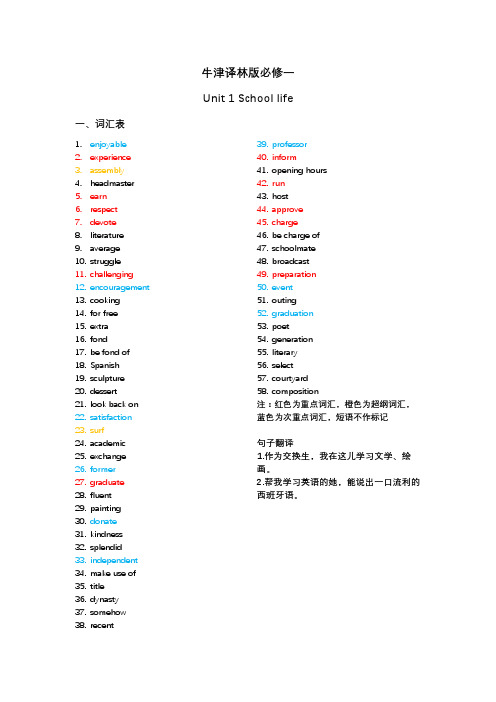
牛津译林版必修一Unit 1 School life 一、词汇表1.enjoyable2.experience3.assembly4.headmaster5.earn6.respect7.devote8.literature9.average10.struggle11.challenging12.encouragement13.cooking14.for free15.extra16.fond17.be fond of18.Spanish19.sculpture 20.dessert21.look back on22.satisfaction23.surf24.academic25.exchange26.former27.graduate28.fluent29.painting30.donate31.kindness32.splendid33.independent34.make use of35.title36.dynasty37.somehow38.recent39.professorrm41.opening hours42.run43.host44.approve45.charge46.be charge of47.schoolmate48.broadcast49.preparation50.event51.outing52.graduation53.poet54.generation55.literary56.select57.courtyardposition注:红色为重点词汇,橙色为超纲词汇,蓝色为次重点词汇,短语不作标记句子翻译1.作为交换生,我在这儿学习文学、绘画。
2.帮我学习英语的她,能说出一口流利的西班牙语。
二、重点词汇知识讲解1.experience n.经历;经验vt.经历,体验常见搭配have experience in/at doing sth有做某事的经验be experienced at doing sht在做某事有丰富经验知识拓展experienced adj 老练的2.earn vt 获得;赚常见搭配earn money 赚钱,挣钱earn one’s living 谋生earn sb sth 为某人赢得某物知识拓展earning n工资,收人earner 挣钱者3.respect n/vt 尊敬;n方面常见搭配in respect of sth 关于某事respect sb for doing sth因为做某事而尊重某人知识拓展respectful adj 尊敬的respectable adj 体面的4.devote常见搭配be devote to 致力于devote oneself to 致力于;献身于知识拓展devotion n献身,热爱devoted adj 忠诚的5.graduate vi/n 毕业生常见搭配graduate from 从·······毕业graduate in 毕业于知识拓展graduation n毕业rm vt 通知;告知常见搭配inform sb of sth 通知某人某事keep sb informed of 让某人知晓知识拓展information n 信息;消息7.run vt 管理常见搭配run dry 变得干涸run after 追赶run out 用完知识拓展running n跑;管理8.approve vt/vi 批准;赞同常见搭配approve of sb/sth/doing sth赞成某人/某事/做某事知识拓展approval n 赞成;同意9.charge n 负责vt收费;使承担责任常见搭配free of charge 免费in charge 负责put sb in charge 让某人负责知识拓展charger n充电器;战马10.preparation n准备常见搭配in/make preparation for 为······做准备知识拓展prepare vt/vi 准备11.challenging adj 有挑战性的常见搭配challenge sb to do sth 质疑某人做某事知识拓展challenge n 挑战v 向·····挑战;质疑challenger n 挑战者三、课外学堂情景交际If you don’t mind 如果你不介意的话(表示同意)俗语Achilles heels 致命伤,最大的弱点last straw 最后一击。
高中英语上外版必修第一册Unit1SchoolLifeSelf-assessment课后练习、课时练

一、完形填空文章大意:这是一篇记叙文。
文章讲述了主人公Jenny在进入高中之后所经历的变化与不同以及她逐渐适应变化的过程。
1. Jenna, a popular girl from Westwood Middle School, had graduated first in her class and was ready for new_______ in high school._______, high school was different. In the first week, Jenna went to tryouts for cheerleaders. She was competing against very talented girls, and she knew it would be _______ for her to be selected. Two hours later, the _______ read a list of the girls for a second tryout. Her heart _______ as the list ended without her name. Feeling _______, she walked home carrying her schoolbag full of homework.Arriving home, she started with math. She had always been a good math student, but now she was_______. She moved on to English and history, and was _______ to find that she didn’t have any trouble with those _______. Feeling better, she decided notto________ math for the time being.Later in math class, Jenna devoted herself to figuring out the problems that had given her so much________. By the end of class, she understood how to get them right. As she gathered her books, Jenna decided she’d continue to try to ________ at her new school. She wasn’t sure if she’d succeed, but she knew she had to ________. Highs chool was just as her mom had said, “You will feel like a small fish in a big pond________ a big fish in a small pond. The challenge is to become the ________ fish you can be.”1.A.processes B.decisions C.challenges D.exercises2.A.Therefore B.Otherwise C.However D.Besides3.A.boring B.easy C.difficult D.interesting4.A.editor B.boss C.winner D.judge5.A.jumped B.stopped C.sank D.raced6.A.awful B.strange C.happy D.lonely7.A.struggling B.improving C.working D.crying8.A.amazed B.annoyed C.shocked D.relieved9.A.homework B.books C.subjects D.objects10.A.put up B.prepare for C.worry about D.give up11.A.pleasure B.trouble C.hope D.sorrow12.A.fit in B.look out C.stay up D.get around13.A.swim B.try C.ask D.escape14.A.in return for B.out of C.in terms of D.instead of15.A.biggest B.best C.weakest D.prettiest二、阅读选择(阅读理解)文章大意:本文是一篇记叙文,主要讲述了作者第一天去新学校上学的经历,作者刚来的时候对别人来说是个陌生人,但一天下来他给许多人留下了印象,还收到了加入足球队的邀请。
8A-Unit-1---School-life---知识点汇总(word文档物超所值)
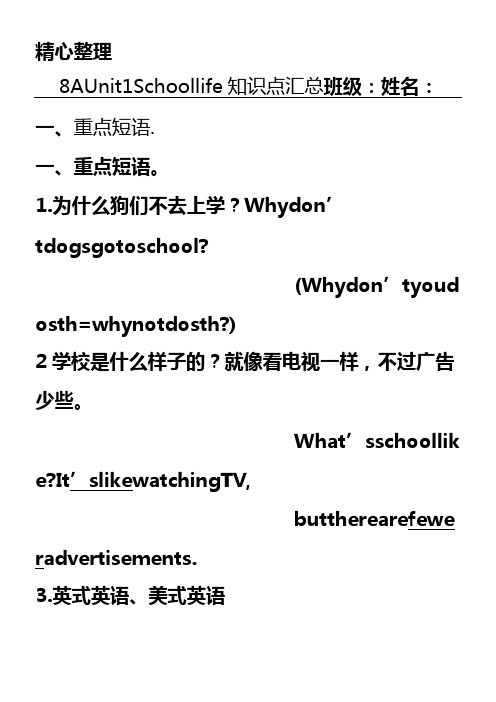
8AUnit1Schoollife知识点汇总班级:姓名:一、重点短语.一、重点短语。
1.2buttherearefewe radvertisements.3.英式英语、美式英语BritishEnglishAmericanEnglish4在八年级inYear8/in8th grade//Grade8 5一所混合学校amixedschool67891011从家中带来书和杂志bringinbooksandmagazinesfromhome12不得不告诉老师我们在看什havetotellourEnglishteacherwhatwearereadi ng131415161718上驾驶课havedrivinglessons19开车送我上学drivemetoschool/=takemetoschoolbycar/in one’scar20一周一次/两次once/twiceaweek212223242526helpsbwithsth/helpsbdosth/helpsbtodosth 27帮助我了解所有新学校的事情helpmelearnallaboutmynewschool 28有半小时的家作要做havehalfanhourofhomeworktodo36读更少的故事readfewerstories37吃更少的西红柿eatfewertomatoes 38植最少的树plantthefewesttrees 39花费更少的钱在光盘上spendlessmoneyonCDs40喝最少的牛奶drinklessmilk精心整理41得最少的分scorethemostpoints42网友onlinefriends43和-------一样=象-------一样bethesameas-------44和-------不同bedifferentfrom------45----的数目是多少?----的数目是-----what’sthenumberof----?Thenumberof-----is------. 46大量的alargenumberof-------=alotof-------47暑假的长度thelengthofthesummertime 48穿校服wearschooluniforms49505152ol?535455beabletodosth/candosth/havetheabilitytod osth/havetheability ofdoingsth56朝窗外看lookoutofthewindow57585960616263有半小时的家作havehalfanhourofhomework64有许多课外活动的时间havelotsoftimefor/todoafter-schoolactivities69穿校服/戴领带wearschooluniforms/wearties70参加去博物馆或剧院的学校旅行goonaschooltriptoamuseumoratheatre 71回形针paperclips727374(Eg few和little单独使用时表示否定;afew和alittle表示肯定(几个/一点)lessthan少于,不到;morethan多于,超过;atleast至少;atmost最多eg:Tom,thereis__________(few/little) milkinthefridge.Gotobuysome.Ihave___________(afew/alittle)friendshere,soI seldomfeellonely.2.各种级别之间的相互转换:Eg:①Ihavemorebooksthanyou.精心整理→Youhavefewerbooksthani②ThereislessairpollutioninSunshineTownth aninotherareasofBeijing.→ThereismoreairpollutioninotherareasofBei jingthaninSunshine Town.3.bethesame是一样的lookthesame看起来一样lookthesameas-----=looklike-----看起来象-----bethesameas------和------一样bedifferent是不同的lookdifferent看起来不同么eg③as;Eg③4.s(②ofthetwoEg:Whichis taller,TomorJack?Whichis thetallerofthetwo boys?5.最高级的固定结构:①oneofthe+最高级+名词复数表示:最怎么样的-----之一②the+最高级+名词单数ofall表示:所有-----中最怎么样的③It’sthe+最高级+名词+现在完成时的句子Eg:Chinaisoneofthebiggestcountriesinthew精心整理orld. Dogisthecleverestanimalofall.It’s themostinteresting filmI haveeverseen.这是我(到现在为止)所看过的最有趣的电影6.1.2.3.___________________________________thangirlsinou rclass.4.Sandy喝的牛奶比Simon少。
1 Unit 1 School life 课件(共53张PPT)
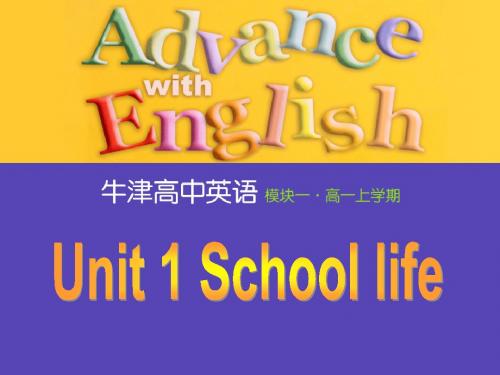
(二) 派生单词
13. enjoyable adj. 有乐趣的;令人愉快的 → enjoy v.喜欢;享受 14. respect n.&vt. 尊敬,尊重 → respectful adj. 恭敬的, 尊重人的 15. challenging adj. 具有挑战性的 → challenge n.&v. 挑战 16. devote vt. 致力于;献身 → devoted adj. 忠实的;深爱的 → devotion n. 奉献;挚爱
17. donate vt. 捐赠 → donation n.捐赠,捐款 → donator n.捐赠者 18. graduation n.毕业 → graduate v.毕业 → graduate n.(大学)毕业生 19. approve vt.&vi. 批准,通过;赞成,同意 → approval n.批准,赞成 20. preparation n.准备,筹备 →prepare v.把……准备好,筹备 → prepared adj. 有准备的
【运用】 ①He is in charge of the project because he is rich in experience. 由于他富有经验,所以他负责这项工程。 →The project is in the charge of him because he is rich in experience. Tip in charge of “负责,掌管”,主语通常为 人,含主动意义。in the charge of “由……主管”,主语通常为物,含被动 意义。
⑷ in respect of (=with respect to) 关于;至于 ⑸ give/send one’s respects to sb. 代某人问 候 某人 ⑹ respect sb. for ... 因……而尊重某人
8AUnit1Schoollife知识点汇总情况
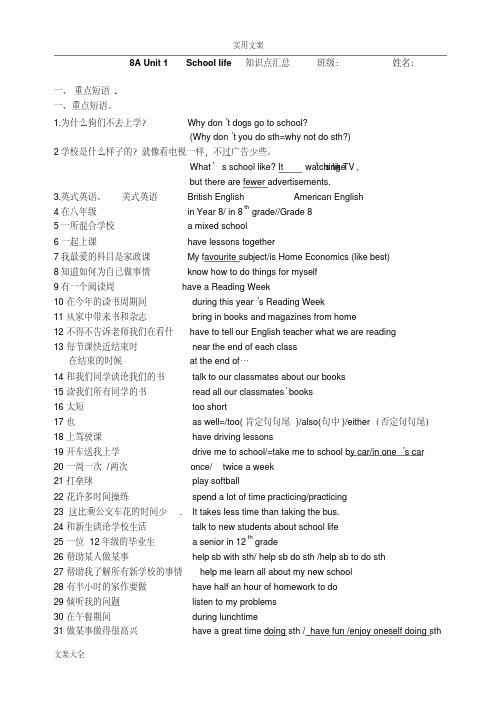
实用文案文案大全8A Unit 1 School life 知识点汇总班级:姓名:一、重点短语.一、重点短语。
1.为什么狗们不去上学?Why don’t dogs go to school?(Why don’t you do sth=why not do sth?)2学校是什么样子的?就像看电视一样,不过广告少些。
What’s school like? It’s likewatching TV,but there are fewer advertisements.3.英式英语、美式英语British English American English4在八年级in Year 8/ in 8th grade//Grade 85一所混合学校 a mixed school6一起上课have lessons together7我最爱的科目是家政课My favourite subject/is Home Economics (like best)8知道如何为自己做事情know how to do things for myself9有一个阅读周have a Reading Week10在今年的读书周期间during this year’s Reading Week11从家中带来书和杂志bring in books and magazines from home12不得不告诉老师我们在看什have to tell our English teacher what we are reading13每节课快近结束时near the end of each class在结束的时候at the end of…14和我们同学谈论我们的书talk to our classmates about our books15读我们所有同学的书read all our classmates’ books16太短too short17也as well=/too(肯定句句尾)/also(句中)/either(否定句句尾)18上驾驶课have driving lessons19开车送我上学drive me to school/=take me to school by car/in one’s car20一周一次/两次once/ twice a week21打垒球play softball22花许多时间操练spend a lot of time practicing/practicing23 这比乘公交车花的时间少. It takes less time than taking the bus.24和新生谈论学校生活talk to new students about school life25一位12年级的毕业生 a senior in 12th grade26帮助某人做某事help sb with sth/ help sb do sth /help sb to do sth27帮助我了解所有新学校的事情help me learn all about my new school28有半小时的家作要做have half an hour of homework to do29倾听我的问题listen to my problems30在午餐期间during lunchtime31做某事做得很高兴have a great time doing sth /_have fun /enjoy oneself doing sth。
四年级上册英语教案-Unit1《Schoollife》-鲁科版(五四制)(三起)

四年级上册英语教案Unit 1《School life》鲁科版(五四制)(三起)教学内容本单元以《School life》为主题,通过学习,学生将掌握与校园生活相关的英语词汇和基本句型,能够用英语描述日常校园活动。
内容包括学校设施的词汇学习,如classroom, library, playground等;日常校园活动的表达,如go to class, read books, play sports等;以及通过角色扮演等方式模拟校园生活场景,练习英语口语交流。
教学目标1. 知识与技能:使学生掌握本单元的生词和重点句子结构,能够准确运用英语描述校园生活。
2. 过程与方法:通过听、说、读、写的多样化教学方法,提高学生的英语综合运用能力。
3. 情感态度价值观:培养学生对校园生活的热爱,增强团队协作意识,激发学习英语的兴趣。
教学难点1. 词汇的记忆与应用:学生对新词汇的掌握和在实际语境中的运用能力。
2. 句型的构造与口语表达:学生能否正确构造句子,并在模拟情景中流畅表达。
3. 文化差异的理解:学生对中英文化中校园生活差异的认识和理解。
教具学具准备1. 多媒体教学设备:用于播放课件、视频和音频资料。
2. 图片卡片:用于词汇教学的视觉辅助。
3. 角色扮演道具:模拟校园生活场景,增强学生参与感。
4. 教学录音机:用于录音和播放学生的口语练习。
教学过程1. 导入:通过展示校园图片,引导学生回顾校园生活,激发学习兴趣。
2. 新授:介绍本课的主要词汇和句型,通过例句解释用法,让学生跟读并模仿。
3. 实践:分组进行角色扮演,模拟校园生活场景,鼓励学生用英语交流。
4. 巩固:通过课堂练习和小游戏,加深学生对词汇和句型的记忆。
6. 作业布置:布置相关的书写和口语作业,巩固学习成果。
板书设计板书将围绕本课的核心词汇和句型进行设计,清晰展示教学内容,方便学生记录和复习。
同时,板书还将包含关键的语法点和注意事项。
作业设计1. 书面作业:完成课后练习题,巩固词汇和句型。
译林牛津版高一英语必修一unit1schoollife教案
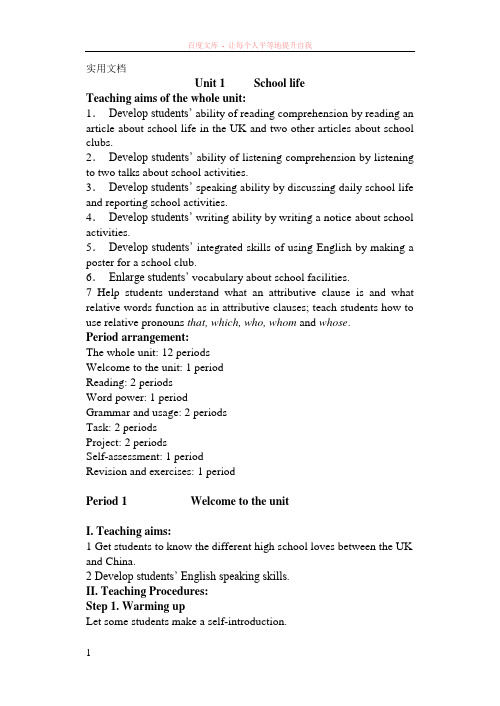
Unit 1 School lifeTeaching aims of the whole unit:1.Develop students’ ability of reading comprehension by reading an article about school life in the UK and two other articles about school clubs.2.Develop students’ ability of listening comprehension by listening to two talks about school activities.3.Develop students’ speaking ability by discussing daily school life and reporting school activities.4.Develop students’ writing ability by writing a notice about school activities.5.Develop students’ integrated skills of using English by making a poster for a school club.6.Enlarge students’ vocabulary about school facilities.7 Help students understand what an attributive clause is and what relative words function as in attributive clauses; teach students how to use relative pronouns that, which, who, whom and whose.Period arrangement:The whole unit: 12 periodsWelcome to the unit: 1 periodReading: 2 periodsWord power: 1 periodGrammar and usage: 2 periodsTask: 2 periodsProject: 2 periodsSelf-assessment: 1 periodRevision and exercises: 1 periodPeriod 1 Welcome to the unitI. Teaching aims:1 Get students to know the different high school loves between the UK and China.2 Develop students’ English speaking skills.II. Teaching Procedures:Step 1. Warming upLet some students make a self-introduction.1. Introduce themselves.2. Say something about their junior high school life.3. Pair work: brain storm:When we are talking about our school life, what will we probably think of?What words or phrases will we use to describe our school life? Step 2 Presentation1.Say the following to students:It’s the beginni ng of the new term. You’ve just finished your junior high and are about to enter a new period in your studies. I am happy to give your lessons and I hope we can be friends.I can see that some of your are eager to know what studying at senior high will be like. Will it be differ4ent from junior high? Well, there are certainly many differences between junior high and senior high, but there are also some things that are the same in every school in China. What about schools in other countries? Do you have different experiences? Are schools all over the world the same? This is the subject of our first unit.2. Ask students to read the instruction and tell them:Here are three pictures that show some aspects of school life in the UK. Please read the instructions, look at the pictures: what's the difference between schools in China and the UK?Step 3 Discussion1 Ask students the following questions to talk about the words in the four pictures:Huge campus and low-rise buildingsWhat does huge mean?What does low-rise mean?What about campus and school buildings in China?(Schools in China usually have a large enough campus to make sure students have enough space to study and play. But most school buildings have at least 3 storeys.)Lockers for every studentDo you know what a locker is?(There are rows of lockers by the classrooms for students to put their bookd, exercise-books and other belongings.)What do you think about locker for students?Do you think that we should have such locker in our school? Why or Why not?Fewer students in each classHow many students are there in our class?Do you know the number of students in a class in the UK?At ease with our teacherWhat can we know from this picture?What does the word ease mean? What do you think the phrase at ease mean?Were you getting on well with the teacher when you were in junior high?What relationship do you want to have with your teachers in senior high?2 Ask students to work in groups to talk about the four pictures and the differences between schools in the UK and China. Then ask several students to report their discussion to the whole class.aspects In the UK In ChinaHuge campus and low-rise buildings We can see hugecampus andlow-rise buildings.It is the biggestdifference fromschools in ChinaSchools in China usually have alarge enough campus to make surestudents have enough space tostudy and play in.But most school buildings aretaller, at least three storeys.Lockers for every student There are rows oflockers by theclassrooms forstudents to put theirstationary, books,exercise-books andother belongings.Students bring what they need forlessons to school and then take itall back home after school. Mostschools in china do not haveequipment in the classroom.Fewer students in each class There are fewerstudents in a class,no more than 30 perThere are usually more students inhigh school, perhaps 40 to 50 perclass. Recently some schools areclass. beginning to limit the number ofstudents in each class.At ease with our teacher Students have aclose relationshipwith their teachers.They feel at easeand comfortablewith them.It is similar in china. Nowadays,lots of teachers and students haveestablished a good relationshipwith each other. They respect eachother and work to gain a betterunderstanding of each other.3. Ask students to discuss the three questions in pairs, and them ask some of them to report their answers to the questions to the whole class.What is your dream school life like?What kind of school activities do you enjoy?What do you think of your life here in the new school?Step 4 Summary and HomeworkToday we’ve mainly talked about the differences between the high school lives in the UK and in China. After class you should:1) Recall all the new words and expressions that we learn in this lesson.2) Find more about any other differences between the high school lives in the UK and in China, either by surf the Internet or by reading some articles in newspapers or magazines.3) Preview the following part: reading (page 2 to page 4).Period 2 Reading (1) School life in the UKTeaching aims:1. Get students to know what school life is like in a high school in the UK.2. Develop students’ ability of reading comprehension through:1)skimming and scanning.2)Guessing the meanings of some new words from the context3. To learn some expressions about school life.Teaching procedures:Step 1 Lead-in and PresentationSay the following to the students:Yesterday we’ve talked about the differences between the high school lives in the UK and in China. We know well about the high school lives in China, because we are Chinese. But we know a little about the high school lives in the UK. Yeah? Today we are going to read a magazine article which is written by an exchanging student. She has been studying in the UK for one year. Now she gives a clear brief introduction about her school life there.(Bb: School life in the UK) Before we read the article, we are going to learn the reading strategy: skimming and scanning.Please look at page 3: Reading strategy. (Bb the following while learning the reading strategy. )Skimming: to get a general idea of the article, without studying it in detail.Focus on the titles, headings, the first and last sentences or paragraphs, charts and pictures …scanning: to find certain information in an article quickly.Look for key words and phrases, dates and numbers, etc.Step 2. Reading1. Skimming:Question: How does Wei Hua feel about her life in the UK?2. Scanning:1)Ask students to go through the three questions in part A and makesure that each of them know the meaning of each question.(AWoodwork class is a class in which students make somethingfrom wood.)Ask students to read the passage as quickly as possible and try to find answers to the three questions. Remind students only tofocus on and identify the most important information.2)Ask student to reread the passage and complete Part C1individually. Then ask some of them to give the answers to thequestions in Part C13)Ask students to finish Part C2 individually. Then get somestudents to share their answers with the whole class. Ask them to say the true sentences to correct the false ones.3 GuessingAsk students to finish Part D individually. Tell them not to look up the meanings of the words from the wordlists in the textbook. Let themguess the meanings from the context. Then check the answers with the whole class.Step 3 New Words in this UnitStudy the new words appears from page2 to page 5 (from attend to immediately) at page 68.Step 4. Homework.1. Complete part E on page 5.2. Read the two articles in reading on pages 82 and 83 in wb and answers the questions below them.3. Learn all the new words we learned today by heart.Period 3 Reading (2) School life in the UKTeaching aims:1 Help students become more familiar with the article.2 Develop students’ ability of reading comprehension by finding out what topics are covered in the article.3 Develop students’ ability of speaking by discussing the subjects they like in school.Teaching Procedures:Step 1. Revision:Check the homework:1)Have a dictation to go over the words learned last period.2)Check the answers in reading on pages 82 and 83 in wb.3)Ask some students to read the article in Part E to check whetherthey have used the suitable word in each blank.Step 2 Reading1) Ask some students to read the article aloud paragraph by paragraph. Ask other students to find out what topics are covered in it.School hoursSchool assemblyTeachersClass sizeDifferent classes in different classroomsHomeworkSubjects and favourite subjectsWhat to do at lunchtimeBritish food3)Ask students to point out the different high school lives in the UKand in China in these topics.Step 3 DiscussionLet students look at Part F together and discuss the questions in Part F in Pairs. Then get some pairs to act out their discussion in class.Step 4 Language focus1 Ask students to find out the following words, phrases and sentences in the article. Then give some explanations.Words:a)as (since, because, for)b)attend (join, join in, take part in)c)prepared)experiencee)respectf)exciting, excitedg)dropPhrases:a)for freeb)be happy withc)used to do sth.; be/get used to do sth.; be/get used to doing sth.d)the way to do; the way of doing; the way + Attributive Clausee)at the end of; in the end; by the end off)as … asSentences:a)Going to a British school for one year has been a very enjoyableand exciting experience for me.b)I do like eating.c)We also had different students in some class, so it was difficult toremember all the faces and names.2 Ask students to put the following sentences into English in their exercise-books.1) Jim 加入了我们的讨论之列。
Unit 1 School Life 教材非常讲解与练习

UnitOneSchool Life第一单元学校生活非常导航I. Overview 概要This unit introduces and develops the theme of school life. In Wele to the unit,students will be presented with four different aspects of school life in the UK and are asked to pare the differences between high schools in the UK and in China. The Reading text deals with an article from a school magazine which gives us specific information about what school life in the UK is really like. Word Power focuses on words and phrases related to school facilities, with relevant exercises to strengthen students' ability to use these phrases. In Grammar and usage,students will learn what an attributive clause is and what relative pronouns and relative adverbs function as in this clause. They will learn in what circumstances that, which, who, whom or whose are used. Following is the Task section dealing with reporting school activities, in which students will practise the language skills of listening, speaking, reading and writing. In the Project section, students will be asked to read two texts about school clubs and design an attractive poster for a new school club.II. Main points重点词汇attend, earn, respect, achieve, grade, literature, average, prepare, drop, miss, experience, introduce, immediately, develop, display, speech, attention, please, cover, regret, inform, run, approve, broadcast, preparation, close, continue, generation, require, scary, nature短语for free, pay attention to, make preparations for语法1. Introduction to attributive clausesShe was the teacher who taught us English Literature.2. Relative pronouns: that, which, who, whom, and whoseAll my classmates enjoyed the cake that/which I made.The girl that/who/whom you have just seen is very good at English. I sat next to a girl whose name was Diane.句型1.W hat is …like?2.It is difficult to do sth.教材非常讲解Part 1 Wele to the Unitlife1.Read a magazine article about school life in the UK and two other articles aboutschoolclubs. 读一篇有关在英国生活的杂志文章和两篇有关学校俱乐部的文章。
Unit 1 School life 词组归纳(包含练习中的词组)

Phrases in unit 1School life1.two other articles=another two articles 另外两篇文章2.listen to a headmaster talking about school activities 倾听校长谈论学校活动3.report the result of your maths test to your parent 向你父母汇报数学考试成绩4.class teacher 班主任5.low rise buildings 低层建筑物6.be at ease with our foreign teacher 和外教轻松相处7.feel at ease 感到自在stand at ease 稍息stand at attention 立正8.dream school life 梦想的学校生活9.an enjoyable and exciting experience 一次开心的,激动人心的经历10.be happy with the school life = be pleased with the school life 对学校生活很满意11.get up an hour earlier than usual 比以往早一小时起身12.on the first day 在头一天on a cold night 在一个寒冷的晚上13.attend assembly 参加晨会at/during assembly 在晨会上14.sit next to sb 坐某人旁边15.break the rules of our school = break our school rules 违反校规16.the best way to do sth 做某事的最正确方式17.earn respect from 赢得……的尊敬18.earn a living 谋生,过日子19.do sth out of the respect of our teacher 出于对老师的尊敬而做某事20.show respect for sb 尊敬某人21.achieve high grades 取得好成绩make achievements 做出成就22.free the students from the heavy homework 把学生从繁重的家庭作业中解放出来23.not a bit = not at all 一点儿也不not a little = much 非常24.for free 免费发电子25.drop some subjects 放弃一些科目26.set sb a good example 为某人树立好榜样take sth for example = take sth as an example 拿……来举例27.miss talking with my mother 想念和妈妈的谈话miss being punished by the teacher 逃过老师惩罚miss the chance to go abroad for further education 错过出国深造的机会28.play on the school field 在学校操场上玩29.wish sb good luck 祝某人好运 a lucky dog 幸运儿luckily,unluckily30.a different way of life 生活的不同方式31.get a general idea of sth 掌握……的大意32.read the text word by word/word for word 逐字逐句的念课文33.in other words 换句话说in a word 简而言之keep one’s word 守信break one’s word 违背诺言in one’s own words 用自己的话have words with sb 和某人吵架have a word with sb = have a few words with sb 与某人交谈34.on average 平均35.at the beginning of this new term 在新学期之初36.according to sth 按照/根据……37.would like to do sth = feel like doing sth 想要做某事would like to have done 本来想做的但没做38.introduce oneself = make a self-introduction 自我介绍39.like surfing the internet 喜欢网上冲浪40.be different from 与……不同41.at the school entrance = at the entrance to our school 在学校入口处42.turn left = turn to the left 向左转43.go straight ahead for 50 metres 一直向前走50米44.be late for my appointment with the doctor 与医生的约会迟到了45.write/make a description of 对……进行描述46.find my way out 找到出路find my way to+地方找到去……的路47.more than 不仅仅是no more than one year 只有一年48.a car park 一个停车场49.be available for different experiments 可用来做不同的实验50.an indoor swimming pool 一个室内游泳池51.live far away from home 住得离家很远52.internet access 网通53.on〔the〕campus 在校园内54.a piece of office equipment 一件办公设备55.return from China 从中国回来return to China 回到中国来56.after graduating from university 大学毕业后57.upon finishing his study 一完成学业58.develop an interest in teaching English 培养教英语的兴趣59.donate some books to our library 向我们图书馆捐献一些书60.are being displayed = are on show 在展出61.give/make a speech 作演讲62.meet the needs/demands = satisfy the needs/demands 满足需要63.a book referring to Chinese history 一本涉及中国历史的书64.the book referred to in my article 我问中提到的那本书65.leave sth out 忽略某物,省略某物66.forget to do 忘记要做forget doing = forget having done 忘记做过了……67.get home from/after school 下班回家go home after school 放学回家68.in my father’s study 在我父亲的书房69.be hard to please 难以取悦70.pay attention to sth. for long 长时间注意某物71.be presented in shot form 以缩写形式呈现72.be present at the meeting 出席会议73.at present 目前74.for the present 暂时75.all the students present 在场的所有学生76.make a decision 作出决定77.pare sth with 把…和…相比较78.pare sth to 把…比作…79.make parisons 作比较80.in parison with 与…相比81.the more… the more…越…越….82.take turns doing/to do 轮流做某事83.praise sb in public 当众表扬某人84.smoke in public places 在公共场所吸烟85.regret doing= regret having done 后悔做了某事86.regret to do 抱歉要…rm sb of the meeting 提醒他开会88.approve (of) the plan 同意计划, 批准计划89.do sth for preparation90.read aloud = read sth out loud 朗诵,高声读出91.think aloud = talk to oneself 自言自语92.go against nature 违背自然93.be responsible for 为…负责94.work on the task 忙于任务95.achieve the goal 达到目标. 达标96.consist of = be made up of …由…组成97.e up with a plan 想出计划98.sign up 签名99.give advice on how to do sth=give suggestions on how to do sth在如何…给建议100.work out the percentage 算出百分比101.32 percent of the students 32%的学生102.be confident of/about sth 对…有信心103.prepare /make preparations for the ing exam 为即将到来的考试作准备104.with the development of modern society 随着现代社会的发展105.a gifted student 一位有天赋的学生106.pass down from generation to generation / one generation to another 一代一代传下来107.require sb. to do sth..要求某人做某事108.under discussion 在讨论中109.under construction 在建设中110.under consideration 在考虑中练习P.86-931.get a close look at sth. 仔细观察某物2.be a challenging task to sb 一件对某人来说具有挑战性的任务3.turn on your puter 打开电脑4.have a lot of fun 玩得痛快5.weather report 天气预报6. a big drop in temperature 很大幅度的降温7.drop in on sb/at sb’s 拜访某人/某人的家8.drop sb a line 给某人写封短信9.be filled with, be full of 充满10.be helpful of sb to do sth 某人做某事很有帮助11.the progress of the work 工作的进程12.wear long hair 留长头发13.to tell you the truth =to be honest 老实说14.be disappointed at the result 对结果失望15.to my disappointment 失望的是much to one’s disappointment =to my great disappointment16.read between the lines 看出字里行间的意思17.shake hands with 与…. 握手18.be seriously/badly ill 病得很重be seriously/badly hurt 受伤很重19.e to china for business 来中国做生意be in china on business 在中国出差20.be famous for 以…出名,因…而著名21.in the early 1920s 在二十世纪二十年代22.with one’s help 在某人的帮助下with one’s permission 在某人的许可下23.under the leadership of 在某人的领导下24.look forward to doing 盼望做某事25.focus on our studies 集中精力学习26.affect one’s feeling=have an effect on one’s feeling 影响某人的感情27.in all directions=in every direction 朝四面八方in the direction of Beijing 朝方向28.get on/off the bus 上/下车29.take a cut 走近路30.happen to be out 碰巧出门了。
Unit1 School Life课标单词短语
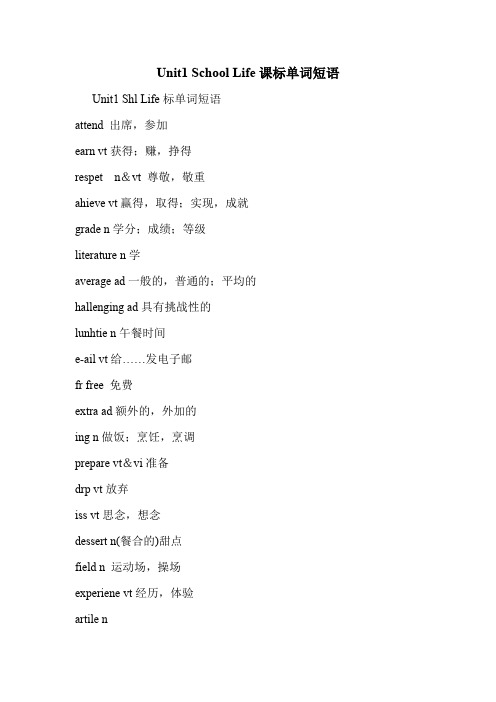
Unit1 School Life课标单词短语Unit1 Shl Life标单词短语attend 出席,参加earn vt获得;赚,挣得respet n&vt 尊敬,敬重ahieve vt赢得,取得;实现,成就grade n学分;成绩;等级literature n学average ad一般的,普通的;平均的hallenging ad具有挑战性的lunhtie n午餐时间e-ail vt给……发电子邮fr free 免费extra ad额外的,外加的ing n做饭;烹饪,烹调prepare vt&vi准备drp vt放弃iss vt思念,想念dessert n(餐合的)甜点field n 运动场,操场experiene vt经历,体验artile npenfriend n笔友intrdue vt介绍iediatel adv立即,马上frer ad从前的,以前的reentl adv最近,近ulture n化develp vt培养,养成phtgraph n照片,相片dnate vt捐赠,捐献;赠予gift n赠品,礼物displa vt陈列,展览indness n善举;好意,善意guest n客人,宾speeh n演说,演讲,讲话flat n套房attentin n注意,关注pa attentin t 注意please vt使满意,取悦title n(书的)名称;(的)韪目,篇名dnast n朝代,王朝ver n(书的)封面;盖子ba ver (书的)封底reent ad新近的,最近的prfessr n教授reent vt&vt遗憾,抱歉;后悔,惋惜infr vt通知,告知run vt管理,经营hst n主持人;主人,东道主apprve vt&vi批准,通过;赞成bradast vt&vi广播;播放preparatin n准备,筹备lse ad亲密的;靠近的uting n短途旅行,远足ntinue vt&vi继续,持续pet n诗人generatin n一代,一代人pe n诗,诗歌selet vt选择,挑选require vt要求sar n 自然,大自然出现短语1 at ease ith2 n f sb / sth3 tell the differenes beteen A and B4 n (the) averageused t d sth6 be happ ith sth/ sb7 fr free8 suh as9 enurage sb t d sth10 intrdue A t B11 pass sth n (t) sb12 be available fr13 far (aa) fr14 ae sure that1 graduate fr universit16 upn/ n ding17 surf the internet18 dnate sth t sb19 frget t d sth20 infr sb f sth21 prepare fr22 be respnsible fr23 be ade up f24 nsist f2 e up ith26 tell sb abut sth27 sund lie28 rd b rd29 drp se subets30 pla n the shl fields31 e-ail sb32 tal t sb abut sth33 prepare t d sth34 than sb fr3 invite sb t be/d36 ae a speeh abut37 run a radi lub38 apprve the idea39 require sb t d sth一.单词应用根据单词的首字母或汉语意思填写正确单词,注意形式变化。
【上海高中英语新教材】上外版第一册Unit 1 School Life 重点梳理
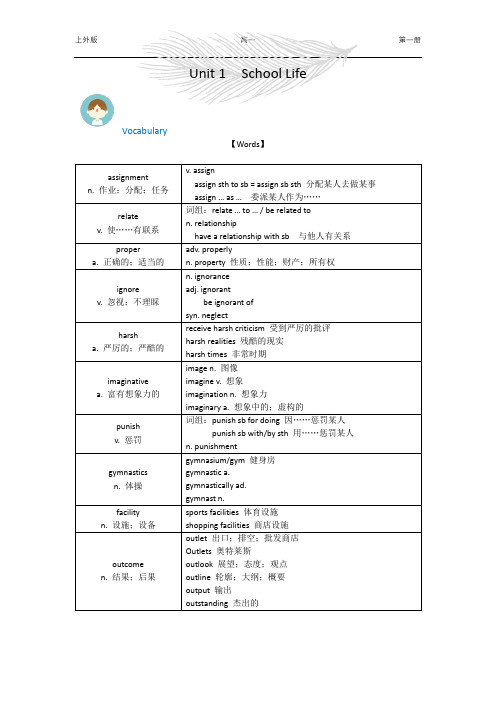
Vocabulary【Words】Grammar【过去将来时】表示从过去某个时间看来即将发生的动作或存在的状态多在宾语从句中作间接引语结构:would + 动词原形was / were going to + 动词原形was / were to + 动词原形was / were about to + 动词原形1. “was / were going to + 动词原形”“was / were to + 动词原形”“was / were about to+ 动词原形”都可以用来表达一种即将实现的意图或打算。
They said that they were going to be sent to meet here at the railway station.2. 条件状语从句和时间状语从句中须用一般过去时代替过去将来时I didn’t know when she came, but when she came, I would let you know. (let)3. would do 也可以表示过去的习惯,以为“总是做,总会做,常常做”。
此处的would是情态动词The little girl lived in a simple and poor house on a hill. Usually she would come toplay in the small garden.【随堂练习】1. —Has Sam finished his homework today?—I have no idea. He ______ it this morning.A. didB. has doneC. was doingD. had done2. — What were you doing when Tony phoned you?— I had just finished my work and ______ to take a shower.A. had startedB. startedC. have startedD. was starting3. —What’s that terrible noise?—The neighbors ______ for a party.A. have preparedB. are preparingC. prepareD. will prepare4. —Hey, look where you are going?5. Did you predict that many students ______ up for the dance competition?A. would signB. signedC. have signedD. had signed Keys: CDBBAFurther Ex.1.You will need to complete three written _______ per semester.2.I don't want you to_______ a word of this to anyone.3.She was unable to attend because of the______ of work.4.My brother would never cheat on his wife; he's not that_______.5.She's very________—she writes poetry and paints.6.She_______him and carried on with her work.7.There was a _______look in her eyes; her mind was obviously on something else.8.I found it difficult to______ the two ideas in my mind.9.I screamed and everyone _______.1-5: assignments;repeat;pressure;sort;creative 6-9: ignored; distant; relate;stared;1. 青少年可能觉得很难抗拒同龄人的压力。
高中英语unit1 单词详解一

号顿市安谧阳光实验学校 Unit 1 School lifeattend / ə′tend / vt. 出席,参加,上(学),去(教堂)I will attend an important meeting at the city government this afternoon.今天下午,我要到市政府去参加一个重要的会议。
Will you attend church with your parents this Sunday?你本周星期天和你父母一起去礼拜吗?We attend school every day except Sunday.我们除星期天外,天天要去上学。
【用法点拨】~ sb/sth照顾某人;参加The mother must attend her sick daughter at hospital.母亲必须在医院照顾生病的女儿。
~ to sb/ sth看护;看管The farmer attends to cattle.那位农民要照料牲口。
【词语辨析】assembly / ə′semblɪ / n. 集会;会议People in this country can’t enjoy freedom of speech and assembly.这个国家的人民没有享受言论和集会的自由。
【词语辨析】earn / ɜ:n/ vt. 获得;赚,挣得You earn much more than I do.你赚的钱比我多很多。
The teacher earns a good fame around the school.这个老师在学习赢得了好的名声。
【用法点拨】~ sth赢得;赚得The husband and wife earn 16,000 yuan a month.那对夫妇每月收入一万六千元。
~ sb sth赢得某人的……Her honesty earns her great respect.她的诚实赢得了人民的尊敬。
高中英语牛津版必修一Unit 1 School life
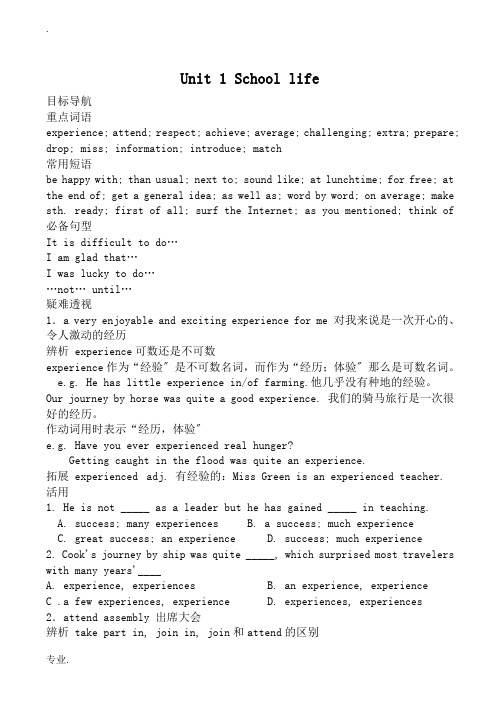
Unit 1 School life目标导航重点词语experience; attend; respect; achieve; average; challenging; extra; prepare; drop; miss; information; introduce; match常用短语be happy with; than usual; next to; sound like; at lunchtime; for free; at the end of; get a general idea; as well as; word by word; on average; make sth. ready; first of all; surf the Internet; as you mentioned; think of 必备句型It is difficult to do…I am glad that…I was lucky to do……not… until…疑难透视1.a very enjoyable and exciting experience for me 对我来说是一次开心的、令人激动的经历辨析 experience可数还是不可数experience作为“经验〞是不可数名词,而作为“经历;体验〞那么是可数名词。
e.g. He has little experience in/of farming.他几乎没有种地的经验。
Our journey by horse was quite a good experience. 我们的骑马旅行是一次很好的经历。
作动词用时表示“经历,体验〞e.g. Have you ever experienced real hunger?Getting caught in the flood was quite an experience.拓展 experienced adj. 有经验的:Miss Green is an experienced teacher.活用1. He is not _____ as a leader but he has gained _____ in teaching.A. success; many experiencesB. a success; much experienceC. great success; an experienceD. success; much experience2. Cook's journey by ship was quite _____, which surprised most travelers with many years'____A. experience, experiencesB. an experience, experienceC .a few experiences, experience D. experiences, experiences 2.attend assembly 出席大会辨析 take part in, join in, join和attend的区别take part in强调积极参加大型活动,并在其中起一定作用join in强调参加正在进行的活动,常有join sb. in意思是“和某人一道做某事〞join指参加、加入某组织,并成为其中的一员attend指出席或参加会议、音乐会、婚礼、宴会等,也可指听课、听报告等e.g. Why do athletes from so many countries want to take part in the Olympic Games?As a young man, he took part in the May 4th Movement.Would you like to join in our discussion?He joined the children in their game.He joined the army at the age of 15.He joined the local club as he needed their support.Today I have a meeting to attend.He has never attended my lectures.拓展attend class 上课attend school 上学attend Beijing University 上北京大学attend a meeting 出席一个会议attend one’s wedding 参加某人的婚礼attend a funeral service 参加某人的葬礼attended the sick man. 照顾病人活用3. Which team will Mr. Wang _____ next year?A. attendB. take part inC. joinD. join in3.earn respect from sb. 赢得某人的尊重achieve high grades 得高分辨析① earn, achieve, gain, obtain, win和getearn “赚得,挣得〞,表示经过艰辛努力所得到的报酬或“博得〞名声、尊敬等。
高一英语Unit 1 School life 教案
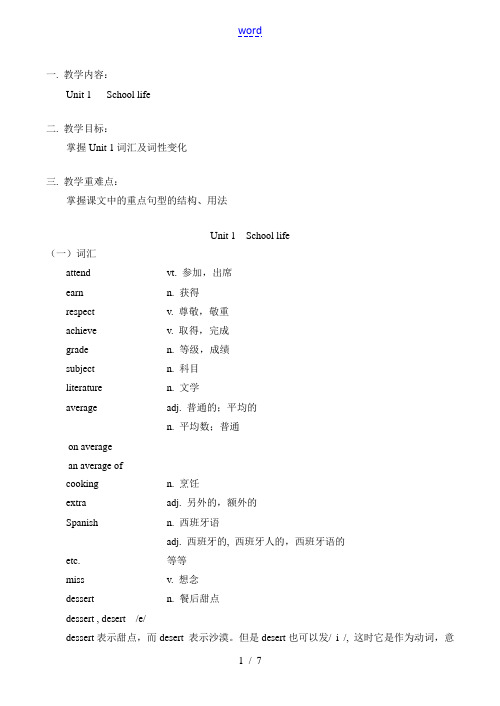
一. 教学内容:Unit 1 School life二. 教学目标:掌握Unit 1词汇及词性变化三. 教学重难点:掌握课文中的重点句型的结构、用法Unit 1 School life(一)词汇attend vt. 参加,出席earn n. 获得respect v. 尊敬,敬重achieve v. 取得,完成grade n. 等级,成绩subject n. 科目literature n. 文学average adj. 普通的;平均的n. 平均数;普通on averagean average ofcooking n. 烹饪extra adj. 另外的,额外的Spanish n. 西班牙语adj. 西班牙的, 西班牙人的,西班牙语的etc. 等等miss v. 想念dessert n. 餐后甜点dessert , desert /e/dessert表示甜点,而desert 表示沙漠。
但是desert也可以发/ i /, 这时它是作为动词,意思是抛弃,离弃。
例:荒岛 a deserted islandexperience vt. 经历,体验辨析experience和experimentexperience 表示经验,经历,而experiment表示实验。
注意两个单词拼法上的区别。
article vt. 文章immediately vi 立刻,马上(二)课文重难点1. meanv. 意味What do you mean?1)mean that +宾语从句我是说你不需要今天就完成。
I mean you needn’t finish it today.2)mean doingFalling into the river on such a cold day means losing your life.学好英语意味着花大量的时间。
Learning English means spending a lot time.3)mean to do 计划=plan to doI didn’t mean to hurt you.我们本打算给你一个惊喜的。
- 1、下载文档前请自行甄别文档内容的完整性,平台不提供额外的编辑、内容补充、找答案等附加服务。
- 2、"仅部分预览"的文档,不可在线预览部分如存在完整性等问题,可反馈申请退款(可完整预览的文档不适用该条件!)。
- 3、如文档侵犯您的权益,请联系客服反馈,我们会尽快为您处理(人工客服工作时间:9:00-18:30)。
Unit 1 School life(1)一、一周知识概述1.掌握和校园生活有关的常用单词、词组与句型。
2.学会描述校园生活和学校设施。
3.重点单词与短语:access, achieve, attend, assembly, article, available, average, canteen, club, challenging, context, donate, display, experience, extra, graduate, gym, heading, locker, low-rise, literature, poster, relax; class teacher 班主任, at ease with 和……相处不拘束, school hours学校作息时间, earn respect from 赢得……的尊敬, sound like听起来像, for free 免费, get a general idea了解大意, as well as 除……以外/也, key words 关键词, word by word 逐字逐句地, find one’s way around 认识路, develop an interest in 培养对……的兴趣, surf the Internet网上冲浪4.语法——定语从句(1)二、重难点知识讲解1.Going to a British high school for one year was a very enjoyable and exciting experience for me.我在英国上了一年的中学,那是一段令我非常开心、非常兴奋的经历。
(1)Going 在本句里作动名词,它和后面的to a British high school for one year构成动名词短语作句子的主语。
go to a British high school本来是个动词词组,在go 后面加上-ing 后,它就具备名词的特性可以在句子中充当主语、宾语或表语。
e.g.Walking after a meal is a very good habit.饭后散步是很好的习惯。
动词的现在分词和过去分词都可以作定语,但所表达的意思不同,现在分词作定语常表示“令人……、正在……”,例如:exciting news; 过去分词则有被动或完成的意思,常表示“感到……的、被……的”,例如:an excited crowd of people, broken heart.(2)这里experience意思是“经历(an event that affects people in some way )”,是可数名词,但表示“经验(the process of gaining knowledge or skill by doing or seeing things)”时为不可数名词。
试比较:e.g.Please tell us about your experiences in the UK.请告诉我们你在英国的经历。
He has had much experience in teaching children in the kindergarten.他有丰富的幼儿教学经验。
experience还可用作及物动词,意为“经验,体验,经历(have experience of sth, feel)”。
e.g.I was very lucky to experience this different way of life,…我很幸运能够体验到这样一种不同的生活……Our country has experienced great changes in the last thirty years. 我国在过去三十年经历了巨大变化。
拓展:experienced adj.有经验的e.g.experienced in teaching 有教学经验的an experienced teacher 一个有经验的老师2.This means I could get up an hour later than usual as schools in China begin before 8 a.m.这意味着我可以晚一小时起床,因为在中国学校8点钟上课。
(1)mean v.意味mean 常见结构:①mean that+宾语从句e.g.I mean you needn’t finish it today. 我是说你不需要今天就完成。
②mean doing 意味着……e.g.Falling into the river on such a cold day means losing your life.这么冷的天要是掉到河里就意味着丧命。
Learning English means spending a lot of time. 学好英语意味着花大量的时间。
③mean to do =plan to do 计划/想要做……e.g.I didn’t mean to hurt you. 我无意伤害你。
We meant to give you a surprise. 我们本打算给你一个惊喜的。
拓展:meaning n.意义,意思e.g.What’s the meaning of this word? Do you know? 这个词什么意思,你知道吗?(2)as adv.同样地,被看作,像prep.当做conj. 与……一样;当……之时;因为本单元多次出现as,用法各不相同,应注意比较。
另外as 还可以构成一些常用词组:as if 好像,as far as 就……而言, so as to 以便于,as for 至于,such as 例如3.On the first day, all students went to attend assembly.第一天,所有的学生都参加了晨会。
attend 是及物动词,意为“出席;到场(to go to /to be present at)”。
e.g.attend a meeting/ lecture 出席会议/听演讲,听课attend a wedding /a funeral 参加婚礼/葬礼attend school/church 上学/教堂辨析:attend, take part in, join和join in都表示“参加”的意思。
但attend 通常与meeting, lecture搭配。
take part in 常常指参加一个重大的活动。
join表示参加一个“组织、团体”等, 也可以说“加入某人”,join sb, 而join in 表示“参加一个活动”,如join in (doing) sth(相当于take part in), join sb in (doing) sth.e.g.We attend school every day. 我们每天上学。
He took part in the celebration. 他参加了庆祝活动。
He joined army five years ago. 他在五年前参军了。
Won’t you join us in the play?你不愿同我们一起去玩吗?He joined in the game. 他加入了比赛。
I’ll join you later. 我随后就加入了你们中去。
4.He also told us that the best way to earn respect from the school was to work hard and achieve high grades.他还告诉我们赢得学校尊敬的最好方法是努力学习并取得好成绩。
(1)“The best way to do sth is to…”结构用来表达“做某事的最好方法是……”。
e.g.The best way to learn English is to use it as often as possible.学英语最好的方法是尽可能的使用它。
the way to do /of doing sth. 做某事的方法e.g.Scientists are trying to find ways to prevent diseases /of preventing diseases.科学家们正在寻求预防疾病的方法。
That’s my way to work/of working.这就是我工作的方法/式。
(2)earn在句中意为“获得(to get something that one deserves because of one’s qualities or actions)”的意思。
e.g.His honesty earned the admiration of his friends. 他的诚实得到了朋友们的赞扬。
The young player earned his place in the team by training hard.这位年青选手由于刻苦训练而在队里取得了地位。
earn作动词还有“挣钱,赚钱(to get money by working)”的意思。
e.g.She earns a high salary. 她挣高工资。
He has earned a lot of money by working in the evenings. 他利用晚上工作,已经挣了好多钱。
5.This sounded like my school in China.这听上去倒是像我在国内就读的中学。
sound在句中用作连系动词,意为“听起来……(to seem …when heard)”。
短语sound like意思是“听上去像”,后接名词,也可接从句。
e.g.Your idea sounds a good one.你的想法听起来很好。
Your explanation sounds reasonable to me.你的解释我听着有道理。
I heard what sounded like fireworks.我听到了好像是焰火的声音。
It sounds like there is something wrong with the fax machine. It beeps all the time.传真机好像有点问题。
它不停地嘟嘟响。
与sound有相同用法的词还有look, taste, feel等感官动词。
e.g.You look beautiful in this blue dress.你穿这件蓝色裙子看起来很漂亮。
